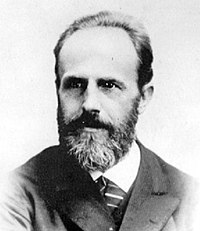
Back ثورفالد ن. ثييل Arabic Thorvald Nicolai Thiele Catalan T.N. Thiele Danish Thorvald Nicolai Thiele German Thorvald Nicolai Thiele EU Thorvald Thiele Finnish Thorvald Nicolai Thiele French トルバルド・ティエレ Japanese Thorvald Nicolai Thiele Polish Thorvald Nicolai Thiele Portuguese
Thorvald N. Thiele | |
|---|---|
 | |
| Born | 24 December 1838 |
| Died | 26 September 1910 (aged 71) |
| Nationality | Danish |
| Alma mater | University of Copenhagen |
| Known for | Cumulant Thiele's voting rules Thiele's interpolation formula |
| Scientific career | |
| Fields | Astronomy, Statistics |
| Institutions | Copenhagen Observatory |
| Doctoral advisor | Heinrich Louis d'Arrest |
Thorvald Nicolai Thiele (24 December 1838 – 26 September 1910) was a Danish astronomer and director of the Copenhagen Observatory.[1] He was also an actuary and mathematician, most notable for his work in statistics, interpolation and the three-body problem.
Thiele made notable contributions to the statistical study of random time series and introduced the cumulants and likelihood functions, and was considered to be one of the greatest statisticians of all time by Ronald Fisher.[2] In the early 1900s he also developed and proposed a generalisation of approval voting to multiple winner elections called sequential proportional approval voting,[3] which was briefly used for party lists in Sweden when proportional representation was introduced in 1909.
Thiele also was a founder and Mathematical Director of the Hafnia Insurance Company and led the founding of the Danish Society of Actuaries. It was through his insurance work that he came into contact with fellow mathematician Jørgen Pedersen Gram.
Thiele was the father of astronomer Holger Thiele.
The main-belt asteroids 843 Nicolaia (discovered by his son Holger) and 1586 Thiele are named in his honour.[1]
- ^ a b Cite error: The named reference
springerwas invoked but never defined (see the help page). - ^ Jerzy Neyman, “Note on an Article by Sir Ronald Fisher,” Journal of the Royal Statistical Society, Series B (Methodological), 18, 2 (July 1956): 288–294, doi:10.1111/j.2517-6161.1956.tb00236.x.
- ^ Reuterskiöld, C. A.; Phragmén, E.; Svensén, Emil; Huss, E. G.; Fahlbeck, Pontus E.; Alin, Oscar (1899). "1899 Vol. 2 no. 2". Statsvetenskaplig Tidskrift. 2. Archived from the original on 2015-06-18.